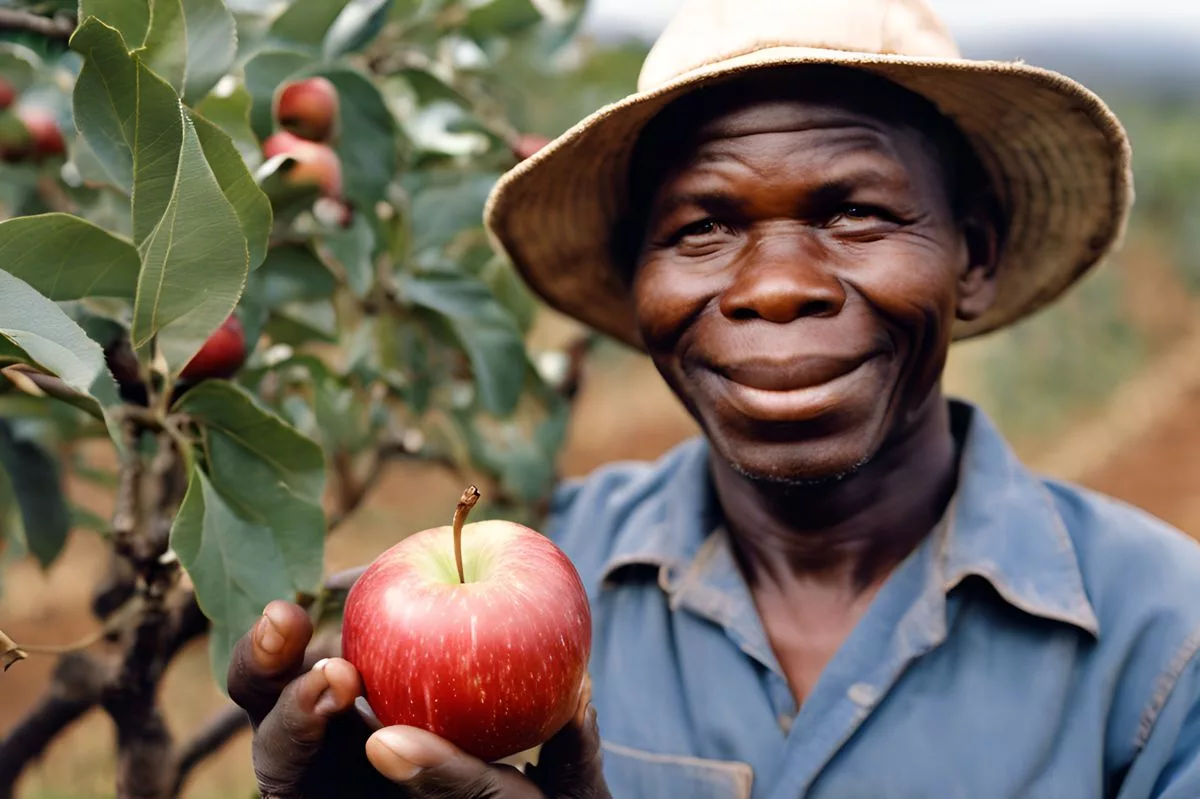Get ready for a new player in the apple world: the Kimito apple! Originating from Japan, this golden-hued fruit boasts impressive storage capabilities, catching the attention of international distributors. Wismettac Foods has partnered with a South African business to introduce the Kimito apple to the farming landscape, potentially creating a strong export market targeting Asia and beyond. The partnership also safeguards intellectual property rights through the “club variety” system, ensuring that Hirosaki University will benefit from a licensing fee.
Introducing the Kimito apple, a golden-hued variant originating from Japan with impressive storage capabilities. Wismettac Foods has partnered with a South African business to introduce the Kimito apple into the country’s farming landscape, potentially carving the path for a strong export market targeting Asia and further afield. The partnership also safeguards intellectual property rights for this apple variety through the “club variety” system.
In the world of apple farming, a dynamic new player has made its debut. The Kimito apple, a golden-hued variant, originates from the thriving orchards of Hirosaki University in Japan. Established in 2016, this late-maturing apple exhibits an impressive longevity, outperforming others in terms of storage capabilities—a feature that has caught the eye of international food distributors.
Wismettac Foods, a renowned supplier of fresh and packaged Japanese food products across the globe, has recently partnered with a business in South Africa to introduce the Kimito apple into the country’s farming landscape. The Kimito apple, with its sweet, almost candied flesh and an unusually high moisture content at its core, offers a distinct addition to the global fruit arena.
Section 2: Cultivation & Potential
The seedlings of the Kimito apple, having successfully passed local quarantine procedures, are now in the experimental cultivation stage in a partner’s orchard in South Africa. The hemisphere difference between Japan and South Africa opens up the exciting prospect of year-round apple availability. This could potentially carve the path for a strong export market targeting Asia and further afield.
This initiative isn’t solely about widening the Kimito apple’s growth horizons. The partnership also ensures that Hirosaki University will benefit from a licensing fee for the intellectual property rights linked to this apple variety in South Africa. Intellectual property rights have previously been a source of controversy, with many instances of Japanese-developed agricultural products being illicitly grown abroad, which led to considerable losses in Japan’s potential export earnings.
Section 3: Protection of Intellectual Property Rights
In an effort to counteract such occurrences, Wismettac Foods has embraced the “club variety” system. This approach safeguards intellectual property rights for a particular plant variety, with production and marketing licenses being exclusively granted to club members.
The choice of South Africa as the stepping stone for the Kimito apple was a strategic decision. Takahiro Masuda of Wismettac Foods explains that South Africa’s geographical location offers numerous strategic benefits, the most significant being its proximity to European and Middle Eastern markets.
The differing seasons between Japan and South Africa present the possibility of marketing apples during off-peak periods, a time when exports from Japan routinely decrease. “The chance to provide Kimito apples, whose quality matches those grown in Japan, at market-friendly prices will also aid in establishing new sales avenues,” Masuda further clarified.
Section 4: Potential for Growth
Wismettac has also hinted at the idea of exporting the Kimito apples from South Africa to Asia. This prospective move is targeted at tapping into the vast and growing middle-income demographic of the continent.
In conclusion, the Kimito apple is more than just a unique, sweet-tasting fruit. It signifies a global cooperative endeavour in agricultural innovation, intellectual property rights preservation, and strategic business expansion. The journey of the Kimito apple, from the flourishing orchards of Hirosaki University to the fertile groves of South Africa, is a powerful testament to the potential of international collaborations and the limitless capabilities of agricultural science.
1. What is the Kimito apple?
The Kimito apple is a golden-hued apple variant originating from Hirosaki University in Japan. It is a late-maturing apple with impressive storage capabilities and a sweet, almost candied flesh with an unusually high moisture content at its core.
2. Who has partnered with a business in South Africa to introduce the Kimito apple to the farming landscape?
Wismettac Foods, a renowned supplier of fresh and packaged Japanese food products across the globe, has partnered with a business in South Africa to introduce the Kimito apple to the farming landscape.
3. What is the “club variety” system for preserving intellectual property rights?
The “club variety” system safeguards intellectual property rights for a particular plant variety, with production and marketing licenses being exclusively granted to club members. This approach is being used to safeguard the intellectual property rights for the Kimito apple.
4. What strategic benefits does South Africa offer for the cultivation and export of the Kimito apple?
South Africa’s geographical location offers numerous strategic benefits for the cultivation and export of the Kimito apple, including its proximity to European and Middle Eastern markets. The differing seasons between Japan and South Africa also present the possibility of marketing apples during off-peak periods.
5. What is the potential for growth for the Kimito apple?
Wismettac Foods has hinted at the idea of exporting the Kimito apple from South Africa to Asia, tapping into the vast and growing middle-income demographic of the continent. This presents a significant potential for growth for the Kimito apple.
6. What is the significance of the Kimito apple?
The Kimito apple signifies a global cooperative endeavour in agricultural innovation, intellectual property rights preservation, and strategic business expansion. Its journey from the orchards of Hirosaki University to the fertile groves of South Africa is a testament to the potential of international collaborations and the limitless capabilities of agricultural science.












